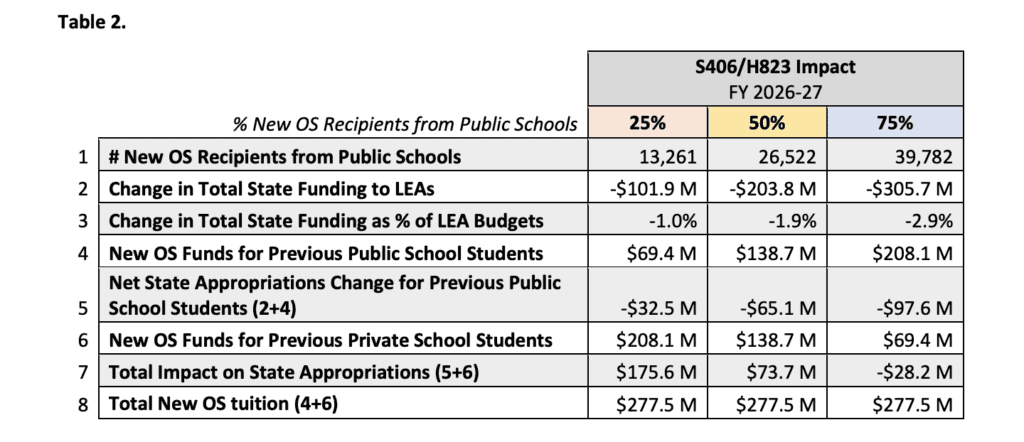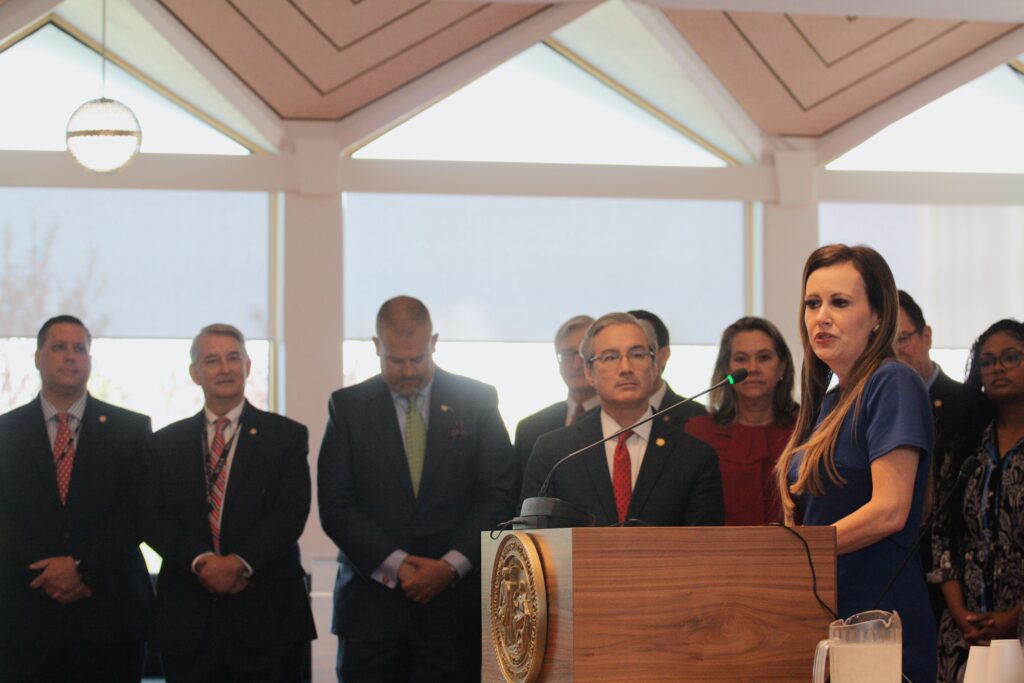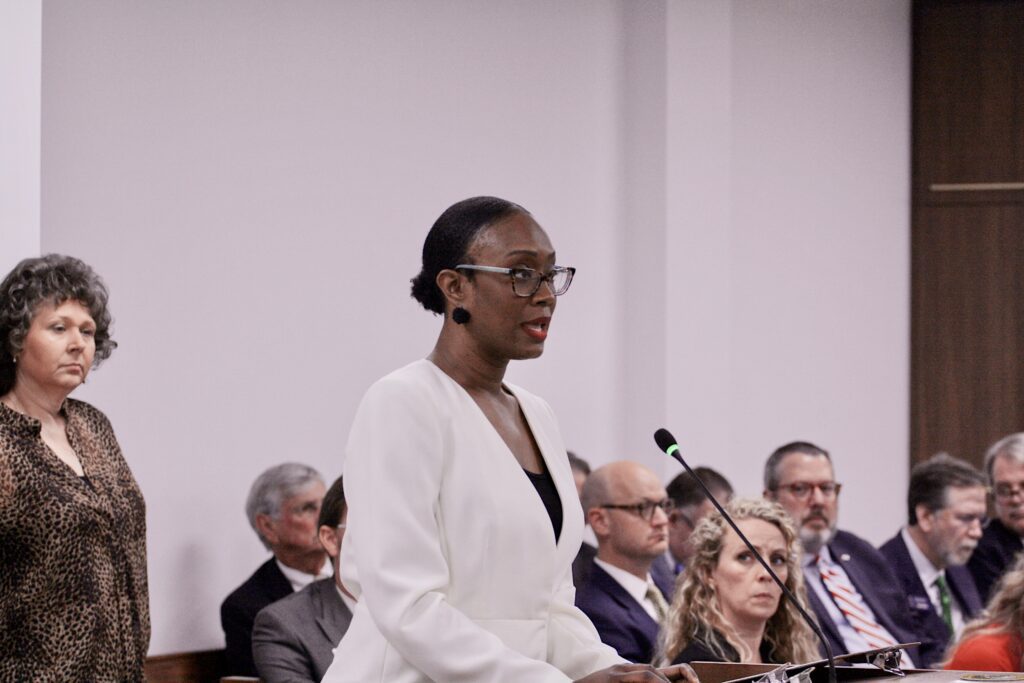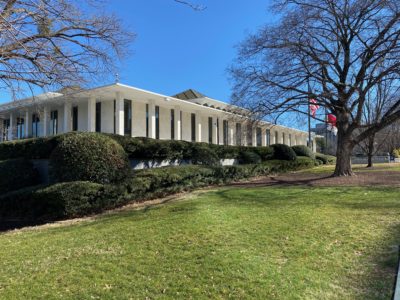
Share this story
|
|
More than 100 education-related bills made last week’s crossover deadline, meaning those bills passed at least one chamber in the General Assembly by May 4.
In general, bills must meet the crossover deadline in order to stay alive. However, bills with a fiscal allocation do not have to make the deadline to be considered during the rest of the 2023-24 session. Other times, lawmakers will add significant amendments to bills that survived crossover, or gut them to add completely new content – though the latter is frowned upon.
This week, the Office of State Budget and Management (OSBM) and the General Assembly’s Fiscal Research Division issued a revised consensus revenue forecast. While the state collected more money than anticipated for the fiscal year, the forecast notes a -$135.8 million (-0.4%) downward revision to projected overcollections.
The Senate budget proposal is also expected to drop soon. It’s possible that the contents of some bills that didn’t make crossover – like free school meals, for example – will appear in the budget.
EdNC will continue to track all education-related legislation moving forward.
You can view the full list of bills that made crossover here.
There were a lot of bills introduced this long session, education and otherwise. Here’s a look at some of them.
K-12
The vast majority of education bills that made crossover are K-12 related.
Before jumping into the bills that did make crossover, here’s a look at where the legislation regarding the expansion of opportunity scholarships and creation of a new funding model stands.
Voucher expansion
On April 26, a bill moved forward in the Senate that would dramatically expand the Opportunity Scholarship program, a program that provides public funding for students to attend private school.
Senate Bill 406, “Choose Your School, Choose Your Future,” was filed by Republicans. If passed, the bill would eliminate income eligibility requirements for the program, guaranteeing up to a 45% scholarship to all N.C. students. It also eliminates the requirement that a student needs to have previously attended a public school.
The House version of the bill, House Bill 823, received a favorable report from the House Education K-12 committee last week.
Bill sponsors said their intent is to guarantee school choice for all North Carolina families. However, the bill could pose a threat to overall funding for public schools and more importantly to enrollment.
A new fiscal note from the Office of State Budget and Management (OSBM) said the bill would decrease total state funding for public schools by $203.8 million if 50% of new Opportunity Scholarship recipients previously attended public school. However, the note points out that it’s difficult to predict the impact with confidence given the broad eligibility expansion.
Here is a look at OSBM’s prediction under three different scenarios.

The bill would impact counties differently based on their estimated number of opportunity enrollees.
Under the assumption that 50% of new vouchers would go to previous public school students, OSBM predicted the following impact on counties:
- Northampton and Bertie counties would see an 8% and 7% decline, respectively, in total state funding for K-12 public education.
- Eight counties (Alamance, Craven, Cumberland, Madison, Mitchell, Pamlico, Pasquotank, and Warren) would see a 5% decline in total state funding for K-12 public education.
- Six counties (Alexander, Hertford, Hoke, Lee, McDowell, and Onslow) would see a 4% decline in total state funding for K-12 public education.
- 15 counties (Buncombe, Durham, Gaston, Harnett, Hyde, Jones, Montgomery, Nash, Richmond, Rutherford, Sampson, Scotland, Washington, Wayne, and Wilson) would see a 3% decline in total state funding for K-12 public education.
You can view a chart further detailing those predictions here.
The Opportunity Scholarship fund, under this bill, would nearly double to an annual allocation of $366,540,000 for the 2024-25 school year. The annual fund amount would continue increasing from there and reach $509,540,000 in 2032-33.
Some critics of the bill asked where that money would come from, noting the General Assembly’s current shortfall of funding Years 2 and 3 of the Leandro Plan for public education is $509,701,707.
Historically, most vouchers go to religious schools, WRAL reported, with eight of the 10 top recipients of Opportunity Scholarships being Christian-affiliated schools. Critics say some religious schools reject certain students, such as LGBTQ+ students and students with a different religious background.
You can read more about the bill here.

Weighted funding model
In March, Senate Republicans filed Senate Bill 670, which would abolish “all funds, grants, allotments, and other sources of funding that expend their funds from the State Public School Fund,” to enact a weighted student funding model. The bill did not make crossover, but due to its fiscal impact, it is likely to still move forward – whether as a bill, or in the Senate budget.
Last month, Sen. Michael Lee, R-New Hanover mentioned weighted funding during a committee meeting regarding the expansion of private school vouchers. At the time, he said many Republican lawmakers believe the state should move toward “backpack funding,” where students are funded wherever they go to school. He said he wants to see “uniform funding among all students.”
“I do think over time we will start establishing weighted student formulas, and those formulas will be the baseline to establish for children,” Lee said. “So it’s a long way of saying that backpack funding for families is where we’re heading with respect to all students.”
North Carolina’s funding system is a resource-based allocation model, which means districts receive money for a certain amount of inputs (i.e. teachers, teachers assistants, etc.) based on the number of students in the district.
North Carolina is one of only 11 states to use some form of resource-based allocation, EdNC previously reported. Most states use a student-based allocation formula, also called weighted student funding.
The bill proposes a base funding amount for each student distributed to the school district on the basis of average daily membership (ADM), which is essentially a measure of enrollment. Additional allocations would be provided to the district for each student for these categories and at these weighted percentages:
- Grades K-5 — 31%
- Grades 8-12 — 29%
- Economically disadvantaged student — 38%
- Small county school district — 32%
- Student headcount of exceptional children — 130%
- Student headcount of academically or intellectually gifted students — 4%
- Student headcount of limited English proficient students — 10%
The bill, as written, does not establish a base per capita amount, but Lee previously said lawmakers would add that as the bill receives input, per a Port City Daily report.
Critics of the bill say it could further extend inequities for certain student subgroups, Port City Daily reported. Others say the bill is a good starting point for discussion, but too rudimentary to overhaul the current funding system as it is written.
Advocates, educators, and lawmakers alike have talked about updating the way K-12 education is funded in North Carolina for years. In December 2019, independent consulting group WestEd released a report containing suggestions to reform the allocation model, after being directed by Judge David Lee to come up with recommendations to meet the mandates of the Leandro case in 2017.
Among many things, the report found that the current distribution of funding is both inequitable and inadequate to meet student needs. For the funding system, as EdNC previously reported, the report “recommends keeping the position allotments (funding from the state for teacher positions) ‘due to widespread popularity’ but phasing in a weighted student funding formula for all allotments besides the position allotments.”
You can read more highlights of the WestEd report here.
Bills expanding charters
House Republicans also filed and passed several bills expanding charter schools.
Charter schools are public schools that are publicly funded but privately operated. Individuals, groups, and both for-profit and nonprofit organizations can apply to open and operate a charter school.
Charter schools are granted freedom from many of the rules and regulations imposed on traditional public schools. Some of the bills below could expand such flexibility.
In February, a bill was filed that would allow charter schools to offer remote academies, like the ones traditional public schools offered during the pandemic.
Another section of the bill allows the state’s two virtual charter schools to continue their pilot status for another year and increase their enrollment – despite consistently being designated as low-performing schools since they were launched in 2015-16.
The bill passed the House in early March. Last week, the State Board of Education approved in a 5-4 vote an expansion request from one of those schools, N.C. Virtual Academy, for the 2023-24 school year. There were 2,849 applicants on the waitlist for the 22-23 school year, according to the request.
Another bill, HB 219: Charter School Omnibus, would change the current determination of per-pupil funding that traditional public schools share with local charter schools. The bill could leave districts with less money per student.
HB 219 adds new categories for financing for charter schools — including sharing of public school fund balances, federal reimbursements, sales tax reimbursements, and facility-use fees collected from outside groups.
The bill also requires districts to share funding for services that not every charter school provides, like NC Pre-K.
An amendment voted on last week also allows charter schools to request adjustments to their target enrollment annually. Low-performing charter schools can ask for up to a 20% increase in authorized enrollment. Previously, those schools could not request an increase in enrollment.
Finally, HB 618: Charter School Review Board, would move authority from the State Board of Education and grant it to a new Charter School Review Board.
Rep. Tricia Cotham, R-Mecklenberg, said the goal of this legislation is to streamline the charter school application process, which she called lengthy and time-consuming. On average, the Board approved just over 26% of yearly charter applications received from 1977 to 2022, according to data presented at the May Board meeting.
“The State Board is constitutionally charged with supervising and administering our public school system,” Rep. Julie von Haefen, D-Wake, said of the bill last week. “So if the Board no longer has the authority to approve or revoke or renew charters, which are public schools, then it’s taking away that supervisory and administrative authority of our public school system and transferring it to a completely different board that was created by our General Assembly.”
Education in the House budget proposal
House Bill 259, 2023 Appropriations Act, contains a number of education-related items and pay raises for teachers.
Read more about the budget passed by the House here. You can also find more details from the proposal below.
Teacher and principal licensure
House Bill 432, which crossed over on April 28 and has passed its first reading in the Senate, would make changes to principal licensure procedures. The bill would no longer require classroom teaching experience for school principals.
Currently, state laws says educators must have at least four years of experience teaching to become a principal. Under HB 432, that statute is changed to require “at least four years of experience as a licensed professional educator.” Such educators could include counselors or social workers, for example.
The licensure changes were recommended by the Department of Public Instruction (DPI).
It also eliminates things like passing a state-adopted exam and replaces it with a portfolio-based assessment where principal candidates can more broadly make their case for principalship. The bill also sets forth requirements for assistant principal licenses, including a one-year internship.
Senate Bill 187 allows for a three-year limited and renewable license for select teachers who cannot successfully obtain their Continuing Professional License (CPL). To qualify for the limited license, the teacher must work with the local board of education and be “an effective teacher.” The local board must request the license.
Former portions of the bill, which would have allowed retired educators to return to work in high-need schools, were removed from the bill.
Here are a few other bills with personnel implications that made crossover:
- HB 201: DST Admin Changes.-AB. This bill makes “administrative and conforming changes to the laws governing the teachers’ and state employee’s retirement system, the local government employees’ retirement system, legislative retirement system, consolidated judicial retirement system, the disability income plan, and to other related statues, as recommended by the Department of the State Treasurer.”
- HB 203: DST Technical Corrections. -AB. This bill is similar to the bill above, but primarily involves minor changes and fixes to the teachers’ and state employees retirement system.
- HB 207: Mandatory Training Contributing to CEUs. This act would “allow educational professionals to obtain continuing education units from completely mandatory trainings,” which could count toward teacher licensure renewal requirements.
- HB 210/SB 239: Reduce Barriers to State Employment. Among other things, this bill would “remove requirements for an academic degree, to the extent practical, when an academic degree is not necessary for the position,” and recognize forms of practical experience and training. This act applies to state employment, and could have implications for some positions at schools and community colleges.
Equality in education, parents’ rights, and more
A number of bills have furthered discussions of so-called “culture wars” in education.
House Bill 187, Equality in Education, “demonstrates the General Assembly’s intent that students, teachers, administrators, and other school employees recognize the equality and rights of all persons and to prohibit public school units from promoting certain concepts that are contrary to that intent.”
Among other things, the bill prohibits the promotion of several ideas included in similar legislation, like the idea that one race or sex is inherently superior to another race or sex.
Senate Bill 49, Parents’ Bill of Rights, seeks to “enumerate the rights of parents to direct the upbringing, education, health care, and mental health of their minor children.” You can read EdNC’s previous coverage of the bill when it passed the Senate in February here.
For both bills, Republicans argue the bills provide important safeguards in education, while opponents say the bills will create chilling effects for educators. Regarding SB49 specifically, critics say it is dangerous to LGBTQ+ kids and will damage educators’ relationships with students.
Last month, the Senate also passed Senate Bill 631, Fairness in Women’s Sports Act. The bill would require transgender athletes at the middle, high school, and college level to play on teams assigned by their “reproductive biology and genetics at birth.” The bill now heads to the House, where the companion bill, HB 574, has already passed. That bill extends those rules to the college level.
Republicans say the bill “is a commonsense solution to the unfair advantage gained when biological males compete in female sports,” per a state Republican press release.
Opponents of the bill say it is an attack on LGBTQ+ rights. No more than 15 transgender athletes have been approved to play high school sports this year in North Carolina, the Associated Press reported, and only two are transgender girls.
Senate Bill 636, School Athletic Transparency, lays out additional rules for school sports, including “biological participation requirements.”
A number of bills also lay out additional protections for students from abuse. Some of the bills detail additional penalties for employees who abuse students, specifically for sex offenses.
You can read more of EdNC’s previous analysis of one of those bills, House Bill 142, here, including questions about data, how students are best protected, and how we can keep good teachers in schools.
Here is a list of all of those bills:
- HB 142: Protect Our Students Act.-AB.
- HB 253: Prevent Students From Harm Act.
- HB 591: Restitution/Sexual Exploitation of Minor.
- HB 748: Felony Child Abuse/Expand Scope.
- SB 579: Prevent Harm to Children.
Various changes to school code
Last month, the House passed a bill that would remove a list of student conduct that “would not be deemed to be a serious violation” from state statute. That language was there in an effort to minimize the time students spend out of school due to long-term suspension or expulsion by limiting those penalties to “serious violations.”
The items currently designated in law as not being serious violations are inappropriate or disrespectful language, not following a “staff directive,” violating dress code, and minor fights that don’t involve weapons or injuries. Under statute, principals have the ability to elevate one of these minor violations to a serious one if they deem it appropriate.
Supporters of the bill, House Bill 188, say it will improve school discipline, while critics worry it could lead to an increase in students missing school and disproportionately impact the number of Black and Brown students receiving discipline.
Another Bill, Senate Bill 90, lays out specific policies for searching students in public schools.
Here are a number of other bills that would change school and district codes:
- HB 605: School Threat Assessment Teams. This bill would establish “threat assessment teams” in public schools, along with peer-to-peer counseling, among other things. It would also expand law enforcement access to all public school units and expand data collection requirements regarding school safety.
- HB 756: Standards Advisory Commission. This would give the General Assembly power to appoint members to a new commission that would recommend public K-12 standards. Currently, those are set by DPI. Read more here.
- HB 382: Registered Nurses in Schools. This would allow registered nurses with at least two years of experience to work in schools. School nurses would no longer have to, within three years of being hired, earn a bachelor’s degree and a National Certification for School Nurses.
- HB 500: NCCWBTC Recs./Medicaid. This would “ensure increased awareness of school-based health services that are reimbursable under North Carolina’s Medicaid State Plan,” among other things. EdNC previously wrote about administrators using Medicaid reimbursement to offer social worker services to every student at the HOPE Program in Edgecombe County Public Schools.
- HB 26: Education Omnibus. This bill would revise the governance structure and admissions standards for the N.C. Center for the Advancement of Teaching. The fourth part of the bill also requires the state superintendent to study school achievement, growth, performance schools, and grades awarded to schools, and report back with suggested changes to school accountability scores by Feb. 15, 2024.
Partisan boards of education
Of those 83 school districts that had elections last November, 41 were partisan races, EdNC previously reported.
Prior to 2013, there were only 10 partisan school districts in the state. Several bills this session seek to further increase that number:
- HB 66/SB 72: Partisan Boards of Election. This bill provides for partisan elections for the Catawba County, Hickory City, Newton-Conover City, and Pamlico County boards of education. (HB 179 and SB 286 also make Pamlico County’s board of education partisan.)
- HB 308/SB 233: Alexander Co. Bd. of Ed. Referendum. This bill would require Alexander County to conduct a referendum on whether to change election method for the board of education from nonpartisan to partisan.
- HB 687: Clarify Vacancy Filing Partisan Bd. of Ed. This bill clarifies the process to fill a vacancy on local boards of education elected on a partisan basis.
Calendar flexibility
House Bill 86, School Calendar Flex/Statewide, provides statewide flexibility in adopting the school calendar.
There are also local bills addressing calendar flexibility in Alamance (HB 45); Halifax (HB 70); Winston-Salem, Forsyth, and Stokes (HB 106); Catawba, Hickory City, and Newton-Conover (HB 115); Pitt (HB 129); Craven (HB 163); Lee (HB 176); Roanoke Rapids Graded School District (HB 195); Yadkin and Davie (HB 221); Carteret (HB 236); Johnston (HB 239); and Granville and Vance counties (HB 306).
Community colleges
The Senate passed Senate Bill 692, a bill that seeks to overhaul governance of the N.C. Community College System (NCCCS), last week after several amendments were filed. One of the major changes rolled back some of the powers the original version vested in the system president.

The amendments to the bill, originally filed last month, came days after the State Board of Community Colleges named Wilkes Community College President Jeff Cox as the new system head.
Among other things, SB 692 would give the Republican-led General Assembly more power, reduce the authority of the State Board of Community Colleges, and take power away from the governor and local leaders. You can read more about the bill here.
The House unanimously passed House Bill 601, which calls for a study of community college funding. That bill now goes to the Senate.
The House also passed House Bill 607, largely along party lines. The bill would prohibit a constituent institution, like the UNC System or the NCCCS, from compelling students or employees to publicly express a given view of social policy.
The bill would also prohibit constituent institutions from requiring applicants for admission or employment to endorse or describe their actions related to matters of contemporary political debate or social action. The bill does not define the terms “social policy,” “matters of contemporary political debate,” or “social action.” It now also goes to the Senate.
Senate Bill 364, Nondiscrim & Dignity in State Work, lays out further guidelines about compelled speech.
Here are a few other bills involving community colleges that made crossover:
- HB 97/SB 93: In-State Tuition Pilot Program. This bill would authorize the State Board of Community Colleges to implement an in-state tuition pilot program for residents of certain Georgia counties at Tri-County Community College in Cherokee County. Read more about the bill here.
- HB 96: NC REACH Act. This bill “requires at least three credit hours of instruction in American history or American government in order to graduate from a constituent institution of the University of North Carolina with a Baccalaureate degree or a community college with an associate degree.”
- SB 680: Revise Higher Ed Accreditation Processes. For UNC System schools and community colleges, this bill would “create a cause of action for postsecondary institutions damaged by false statements made to accrediting agencies, establish a commission to study accreditation, and make certain conforming changes.”
Early childhood
When it comes to early care and education, surviving bills would make tweaks to the way the state rates licensed child care and increase funding for the child care subsidy program.
Senate Bill 20, which restricts abortions after 12 weeks, includes $32 million recurring in 2023-24 and $43 million recurring in 2024-25 to continue setting subsidy rates for providers at the rates a 2021 market rate survey recommends.
The House budget bill also creates a 3-year pilot, with $900,000 for each year, that would split the cost of child care between the state government, participating businesses, and eligible employees based on Michigan’s Tri-Share program. The bill also would cover child care teachers’ children with subsidy in a one-time $10 million pilot and give $1.05 million to Wonderschool to open 300 new home-based child care programs.
The early childhood caucus’ $300 million request to help child care programs avoid a fiscal cliff did not make it into surviving legislation. Neither did a subsidy floor, a policy the caucus proposed that would ensure programs participating in child care subsidy received at least the state’s average rate to care for children.
Providers, teachers, parents, and advocates are worried about the impacts of federal stabilization funds running out without continued support. Rep. David Willis, R-Union, said he is still optimistic those funds will make it into the conference budget.
“That continues to be our push, and I expect that we’ll see that at the end of the day,” said Willis, a co-chair of the early childhood caucus and an owner of a preschool program.
Go here for more on what early childhood policy and funding items remain possible this session:
Here’s a list of education bills that became law this session, followed by a list of all the education bills that made crossover:
Bills passed into law
- Session Law 2023-10: Schools for the Deaf and Blind. (HB 11/SB 62)
- SL 2023-1: Elect Thomasville City Board of Ed. (HB 27)
- SL 2023-2: Reduce Length of Granville Bd. of Ed Terms. (HB 30)
- SL 2023-13: Limited Provisional License Modification. (SB 157/HB 261)
Senate Bill 20, Care for Women, Children, and Families Act, which places new limitations on access to abortions before and after 12 weeks of pregnancy, was passed by the General Assembly earlier this month. Part VII of the bill contains policies concerning child care.
Gov. Roy Cooper is expected to veto the bill on Saturday, May 13. Due to the new Republican supermajority, Cooper is working to convince moderate Republicans to not override his veto. If Republicans successfully override his expected veto, the bill will become law.
Other bills that made crossover
- HB 8: Computer Science Grad Requirement. This would require instruction in computer science and completion of a computer science course to graduate high school.
- HB 23: Education Studies and Other Changes. This bill would revise myFutureNC’s educational attainment goal reporting, conduct a “study for students with extraordinary costs,” revise N.C. Principal Fellows commission membership, and raise the daily deposit limit for public schools.
- HB 38: Entry Fees for HS Interscholastic Events. This bill would require high schools to accept cash for admission at the time of “interscholastic athletic events.”
- HB 49: Protect Religious Meeting Places. This would change current law to allow people with concealed carry permits to carry handguns to places of worship that also serve as schools, or have attached schools. This provision would only be allowed outside of school operating hours.
- HB 60: SUDEP Awareness Week. This would establish the second week in November as SUDEP (Sudden Unexpected Death in Epilepsy) Awareness Week in N.C. It would also recommend awareness training for school personnel responsible for students with epilepsy or otherwise predisposed to seizures.
- HB 72/SB 67: Firearm Safe Storage Awareness Initiative. This bill would launch a two-year firearm safe storage initiative, led by the Department of Public Safety, the Department of Health and Human Services, and the Wildlife Resources Commission. It requires the initiative to create an online toolkit with information on the importance of safe gun storage, how to purchase gun locks, and how to launch local initiatives.
- HB 98/SB 121: Medical Freedom Act. This act would prohibit public schools, state and local public health agencies, state and local public health officials, and local governments from requiring any person to provide proof of Covid-19 vaccination.
- HB 103: GSC Technical Corrections 2023. Clarifies that “within 180 days of the start of the school year, the parent of the child shall present to the school principal or the principal’s designee certification that the child has, within the past 12 months, obtained vision screening.”
- HB 136: Arts High School Diploma Endorsement. This would require the State Board of Education to create an arts proficiency high school diploma endorsement and to make various conforming changes.
- HB 150: School Contracted Health Services. This would allow children with disabilities who received services prior to enrolling in a local educational agency the opportunity to continue receiving those services from the same provider while at school.
- HB 166/SB 139: American Indians Graduating with Honors Act. This would allow Indigenous students to wear eagle or hawk feathers at public school graduation ceremonies.
- HB 172: Samantha Rose Davis Act. This would require medical condition action plans for certain students and medical emergency plans in all public school units.
- HB 223: OSHR/Various SHRA Changes. This would make various changes to the state human resources act and related law, impacting all public school employees.
- HB 262: School Assignment Zones. This local bill would require school assignment zones that allow students opportunity to attend schools closest to their place of residence in Onslow County Schools.
- HB 282: Trade Schools Study. This would compile information regarding the trades workforce and future training.
- HB 314: Conflicts of Interest Training/LEAs. This bill would require conflicts of interest training for certain public school employees.
- HB 347: Sports Wagering. This would authorize and regulate sports wagering on professional, college, and amateur sports in N.C. Under the bill, incentive grants cannot exceed $25,000 to attract State, regional, and national sporting events, tournaments, and programs for nonprofessional athletes participating in programs administered by city, county, and local school administrative units.
- HB 487: POW/MIA Flags/State Bldgs & Schools. This act would require POW/MIA Flags to be flown at state-owned buildings and public schools if the flag can be attached to an existing flagpole.
- HB 600: Regulatory Reform Act of 2023. This would prohibit local governments from imposing requirements on access points for school roads in addition to requirements imposed by the N.C. Department of Transportation.
- HB 621: 3-Year FDA Approval for New Childhood Vax. This would prohibit the Commission for Public Health from adding any new vaccines to the state’s childhood immunization schedule unless the vaccine has been licensed by the U.S. FDA for a minimum of three years.
- SB 52: Open Meetings/Administering Organizations. An act to provide that an administering organization, including school boards, is a public body subject to the provisions of the open meetings law.
- SB 83: No High Risk Apps/Gov’t Networks & Devices. This is an act prohibiting TikTok on government devices and during participation in state-funded programs, including public school units.
- SB 193: Career Development Plans. This would require career development plans for all middle and high school students.
- SB 236: Modernize Audiology Practice Laws. This is “an act to update the General Statutes of North Carolina governing the practice of audiology to better reflect the changes in education, experience, and practice of the profession in order to enhance the health and welfare of North Carolina citizens.”
- SB 384: Carbon Monoxide Detectors/School Bldgs. This act, if passed, would study “the installation of adequate carbon monoxide alarm and detection systems and the implementation of radon gas testing in all identified public schools.”
- SB 389: Parental Consent for Blood Donation. This bill raises the age from 16 to 18 for giving blood without parental consent.
- SB 411: Students in Home School Take PSAT/AP. If passed, this bill would allow homeschooled students to take Advanced Placement (AP) exams, along with the Preliminary Scholastic Assessment Test (PSAT).
- SB 574: Authorize NIL Agency Contracts. Among other things, this would authorize name, image, and likeness agency contracts for student athletes, and laying out guidelines for students who sign such contracts.
- SB 729: CBBC Working Group Changes. This is “an act to amend the anti-pension spiking contribution-based benefit cap law for school systems as brought forward by the working group established by S.L. 2021-72 and to provide additional tools to resolve disputed applications of the anti-pension spiking laws.”
You can view the full list of bills that made crossover here.







